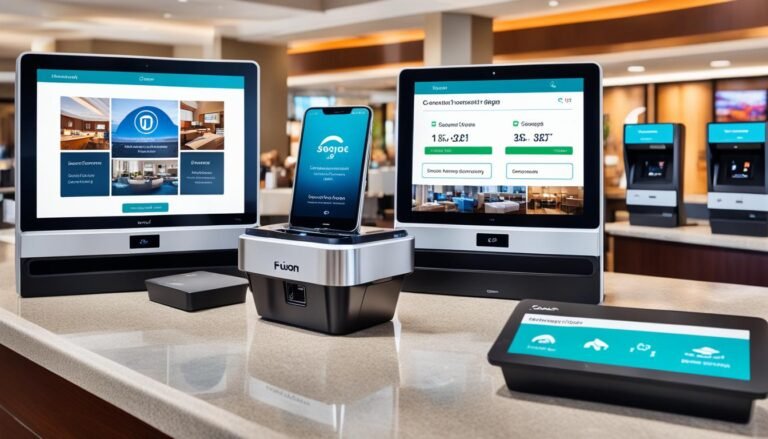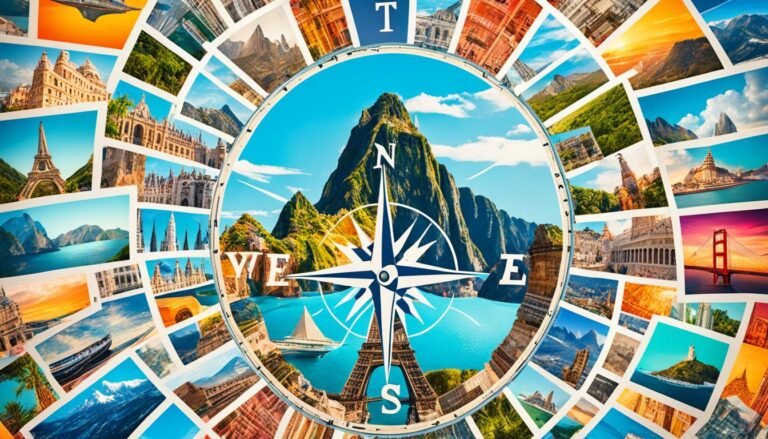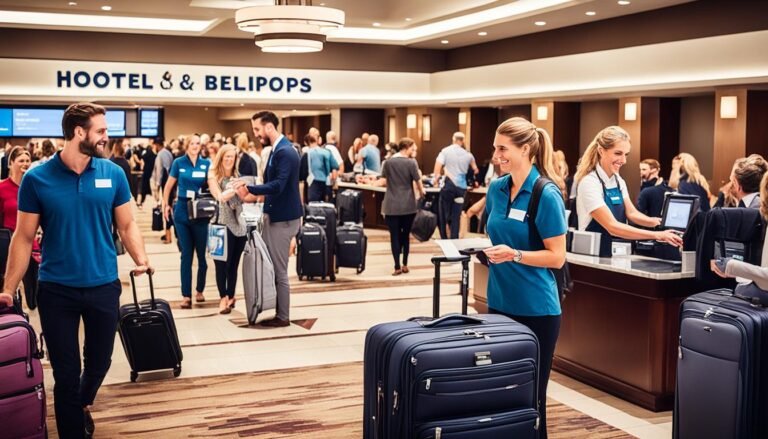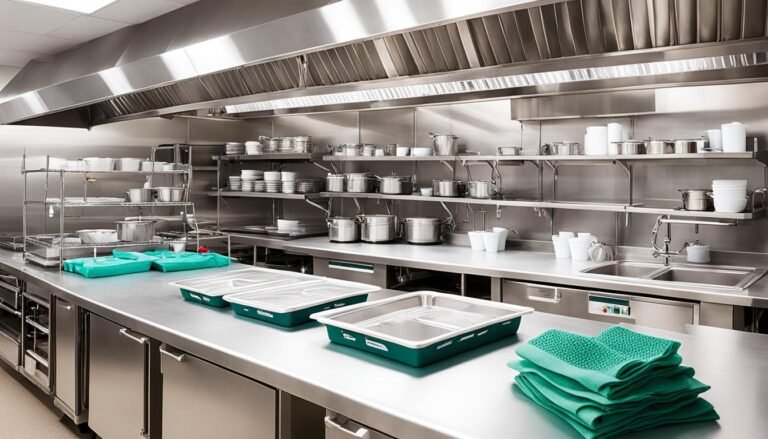CRM Strategies for Hospitality Success
Welcome to the exciting world of customer relationship management in hospitality. Hotels and resorts work hard to offer special experiences to guests. They aim to build loyalty and stay ahead in the changing field of hospitality.
Picture this: You’re searching for the best hotel for your holiday. You go online, checking reviews and photos. Suddenly, a hotel stands out. It promises to meet your every need from the moment you arrive.
You are intrigued and decide to stay at this hotel. Upon arrival, you’re surprised. The staff knows your name and your room wishes. You feel warmly welcomed. During your stay, they suggest personalized activities and dining options.
On your last day, the hotel thanks you. They invite you to join their loyalty program. You feel valued and happy. You know you’ve found a hotel that truly cares about you.
Creating these unforgettable experiences is key for top hotels. They use CRM strategies and software to go beyond guest expectations. This makes guests choose their hotel over others time and time again.
Let’s delve into the CRM techniques that boost success in hospitality. We will cover everything from using guest data to setting up special loyalty programs. These tips ensure happy guests, loyalty, and higher profits in the hospitality world.
Key Takeaways:
- CRM strategies in the hospitality industry focus on creating personalized guest experiences and fostering customer loyalty.
- Data mining and analysis play a crucial role in understanding customer preferences and delivering tailored services.
- Implementing customer loyalty programs and personalized promotions can help hotels retain existing customers and attract new ones.
- Choosing the right CRM tools and processes is essential for effective customer relationship management in hospitality.
- Empowering the customer support team and continuously monitoring CRM performance are crucial for enhancing guest satisfaction.
The Importance of Data-Driven CRM in the Hospitality Industry
Data-driven CRM is vital in the hospitality field. It helps hotels understand what guests like. This way, they can offer a personal touch by learning and responding to each guest’s specific wishes.
Data mining is critical here. It means finding important clues in lots of data to make smart business choices. For instance, hotels can figure out which guest groups bring in the most money. This helps them focus their efforts where they matter most.
Strategies in hotel CRM use data to the fullest. They aim to make guests’ stays better. For group bookings, knowing the best way to reach people is key. This way, marketing efforts are targeted more wisely. It also means a better, more unique experience for each guest, hopefully winning their loyalty.
“Data-driven CRM lets hotels keep up with what their guests want. By looking at data, they can give personalized advice, special deals, and services that fit just right. This makes every stay feel tailored to the guest, making them feel truly valued.”
Incorporating data-driven CRM also boosts how happy guests are. Hotels use what they know about guests to surprise and delight them. This extra effort brings more happy visitors back and makes them recommend the place to others. This is great for building a good name.
Using tools for CRM well is key in hospitality. They collect and read data to improve guest experiences. This way, hotels can offer a more personal visit. They can also get to know their guests better, aiming to keep them coming back.
Data-driven CRM helps hotels be more competitive. They keep getting better at serving what guests want. This ongoing improvement keeps guests happy and loyal while also boosting the hotel’s success.
Choosing the Right CRM Tools for Hospitality CRM
When looking to boost CRM in the hospitality sector, the right tools are key. They help gather, store, and analyze customer data. This gives hotels insights to improve support and make services more personal. Using the right CRM tools helps hotels better guest experiences and create strong customer relationships.
Choosing CRM tools depends on a hotel’s size, budget, and needs. The tools should be fit for the unique demands in the hospitality sector. This way, hotels can manage customer data well and customize their services.
It’s important that CRM tools work well with systems already in place, like booking apps. This connection lets hotels see customer info in real-time. It makes personalized services and quick problem-solving possible. By blending CRM tools with current systems, hotels can run their CRM system better. This leads to a better all-around guest experience.
Implementing effective CRM procedures is a must for great customer service. With customer segmentation, hotels can group customers by their likes and habits. This leads to marketing that really speaks to customers. Setting service standards makes sure everyone gets the same great service. For solving problems, there must be clear steps to follow.
Benefits of Choosing the Right CRM Tools and Processes:
- Improved customer satisfaction through personalized experiences
- Streamlined data management and analysis for effective decision-making
- Enhanced customer support and problem resolution processes
- Efficient integration with existing systems for seamless data flow
- Targeted marketing campaigns and better customer engagement
Choosing the best CRM tools not only unlocks customer data’s full potential but it also raises the CRM game. The right mix of tools, smooth integration, and solid procedures mean a more personal, outstanding guest experience. This boosts customer happiness, loyalty, and revenue.
| CRM Tool | Key Features |
|---|---|
| Customer Data Management |
|
| Communication and Engagement |
|
| Workflow Automation |
|
| Analytics and Reporting |
|
Empowering the Customer Support Team for Effective CRM
CRM leadership relies heavily on the customer support team. They provide crucial support to hotels. It’s important to give them the tools and knowledge needed for customer care.
Training in CRM tools helps them quickly address customer concerns. They learn to solve problems efficiently, which boosts customer contentment.
Empowering the team also involves valuing loyal customers. Recognizing these customers strengthens bonds, boosting satisfaction and loyalty.
Customer feedback is key. Listening to and acting on feedback improves services. It’s a vital step in satisfying guests’ changing demands.
Regular training sessions and recognition are also important. They keep the team’s skills sharp and promote a culture of continual improvement.
Empowering the Customer Support Team: Key Strategies
- Provide comprehensive training on CRM tools and processes to enable effective issue resolution.
- Empower the team with decision-making authority and access to resources for efficient problem-solving.
- Recognize and reward customer loyalty to foster stronger relationships and enhance customer satisfaction.
- Encourage the team to actively seek and listen to customer feedback for continuous improvement.
- Offer regular training sessions and recognition programs to create a culture of learning and growth.
By empowering the support team, hotels can greatly improve their customer service. This leads to better satisfaction and loyalty.
| Benefits of Empowering the Customer Support Team | Effect on CRM Strategy |
|---|---|
| Enhanced customer satisfaction | Improved customer support and personalized experiences |
| Increased customer loyalty | Stronger customer relationships and higher retention rates |
| Faster issue resolution | Efficient problem-solving and reduced customer complaints |
| Valuable customer feedback | Insights for continuous improvement and strategic decision-making |
| Higher employee morale | Motivated and engaged team members |
Monitoring and Measuring CRM Performance in Hospitality
It’s key to check how well hospitality CRM strategies work. This is done by keeping an eye on important metrics. These include customer satisfaction, retention, and the value of their business. Tracking these lets hotels know if their CRM efforts are successful.
Customer satisfaction is a top metric to watch. It shows how well a hotel meets people’s expectations. By using surveys, hotels can find what guests like or don’t like. This helps improve the overall experience.
“Customer satisfaction is the key to long-term success in the hospitality industry. It directly impacts customer retention, word-of-mouth referrals, and the overall reputation of the hotel.” – Jane Williams, CRM Expert
Keeping customers is crucial. It’s cheaper and more beneficial to hold on to them than find new ones. Watching customer retention helps hotels see what keeps guests coming back. This info guides them to build stronger connections.
Listening to what customers say is also a vital part of CRM. Feedback from surveys, reviews, and complaints gives direct insights. It speaks of their likes, dislikes, and suggestions. By acting on this feedback, hotels can improve and make guests happier.
Looking at CRM performance regularly helps spots areas needing work. Data and direct feedback from customers are key. They show what’s working and where adjustments are needed. This continuous effort makes sure hotels remain a top choice.
| Metric | Importance |
|---|---|
| Customer Satisfaction | Essential for ensuring customer loyalty and positive word-of-mouth |
| Customer Retention | A reflection of the hotel’s ability to build lasting relationships and loyalty |
| Customer Lifetime Value | Indicates the profitability of individual customers over their lifetime |
| Loyalty | Shows the level of commitment and repeat business from customers |
| Advocacy | Represents the willingness of customers to recommend the hotel to others |
| Profitability | Reflects the financial impact of CRM efforts on the hotel’s bottom line |
Continuous Improvement and Innovation in Hospitality CRM
Hospitality CRM strategies are key for staying ahead in the industry. To be effective, it’s crucial to always look for ways to do better. This means examining how well CRM systems work and making them even better.
An ideal CRM strategy includes having a clear vision, objectives, and the right tools. Always check on the results to find ways to improve. This way, you can make sure the strategy brings the best outcomes.
Hotels have to find new and smart ways to manage customer support and relationships. They can do this by offering new products or services that meet customer needs. Making things personal also makes guests happy and keeps them coming back.
“In an industry where guest expectations are constantly evolving, it is crucial for hotels to be at the forefront of innovation. By offering personalized experiences, rewarding customer loyalty, and creating a vibrant customer community, hotels can cultivate long-lasting relationships with their guests.”
Improving often means trying out new things and learning from them. By experimenting with different strategies, hotels can figure out the best ways to please their customers.
Here is a table that shows why it’s important to always improve and innovate in CRM:
| Metric | Hotels Embracing Change | Hotels Sticking to Tradition |
|---|---|---|
| Customer Satisfaction | High | Moderate |
| Customer Loyalty | Strong | Weaker |
| Revenue Growth | Steady and Increasing | Inconsistent |
| Customer Community Engagement | Active and Vibrant | Limited Interaction |
By always aiming to get better and being creative, hotels can offer even more to their guests. This helps them stand out in the competitive world of hospitality.
CRM Vision and Objectives for Hospitality Success

Success in the hospitality industry requires a clear CRM vision and objectives. This vision should match overall business goals and what customers want. It ensures a focus on customer satisfaction, loyalty, and referrals, improving the guest experience.
Setting specific and measurable goals is key to guiding CRM strategies. These goals align with the CRM vision. For example, objectives including reducing complaints or improving feedback matter.
It’s crucial to share this vision and objectives with the team. This way, everyone is on the same page and works towards customer satisfaction and loyalty.
Benefits of Establishing a CRM Vision and Objectives:
- Clarifies the direction and purpose of CRM strategies
- Aligns CRM efforts with overall business goals
- Focuses on delivering exceptional customer satisfaction
- Improves customer loyalty and advocacy
- Guides decision-making processes
Defining a CRM vision and objectives helps hotels map out a success plan. It guides them in focusing on customer needs and business growth.
Choosing the Right CRM Tools and Processes for Hospitality CRM
Choosing the best tools and processes for hospitality CRM is key. These tools help hotels track and use customer info like their interests and past interactions. This knowledge helps hotels connect better with customers.
Hotels need tools that suit their size, budget, and goals. It’s important that these tools work well with what the hotel already uses. Whether the tool is online or custom-made, it should help manage customer data and offer personalized service.
Having the right CRM processes is just as important. Sorting customers by what they like and their characteristics can make marketing and communication more effective. This personal touch can make the guests’ experience better.
Creating clear service rules is essential too. It makes sure that all staff knows how to interact with customers in a way that fits the hotel’s brand. These rules can cover how fast to respond to customers and how to handle complaints.
“The right CRM tools and processes enable hotels to leverage customer data and provide exceptional personalized communication.”
Delivering Personalized Communication
Customized communication is crucial in the hospitality sector. Hotels that use customer data to speak directly to their guests can build stronger loyalty. This makes guests feel understood and valued.
CRM tools are vital in sending personalized messages. They help hotels track what guests like and then suggest things they might enjoy. This way, hotels can send more relevant and interesting messages to their guests.
| Benefits of Personalized Communication | Examples |
|---|---|
| Increased customer engagement and satisfaction | – Sending personalized welcome messages based on guest preferences – Recommending nearby attractions or restaurants based on guest interests |
| Improved cross-selling and upselling opportunities | – Offering room upgrades or additional services based on guest history and preferences |
| Enhanced brand loyalty and advocacy | – Sending personalized thank-you messages and exclusive offers to loyal customers |
With the right CRM tools and methods, hotels can turn data into tailored experiences for their guests. This personal touch can lead to better relations and more success in the hospitality business.
Empowering the Customer Support Team for Hospitality CRM Success
For hotels to excel in CRM, empowering the customer support is crucial. Training is key for them to use CRM tools and processes. This helps them offer great and knowledgeable service.
But, empowerment is more than just training. It’s also about giving them power to quickly solve issues. They should be allowed to make choices that keep customers happy. And, it’s vital to ask customers for feedback to improve continuously.
This strategy lets hotels build a team culture that values ownership and puts customers first. In this environment, employees take pride in fostering strong customer ties. They work hard to offer top-notch support each time.
“Empowered customer support teams have the ability to turn a negative experience into a positive one, leading to increased customer satisfaction and loyalty.”
– Customer Support Expert, Jane Davis
Benefits of Empowering the Customer Support Team:
- Cutting-edge CRM leadership: Empowered teams become leaders in implementing CRM strategies, maximizing the potential of CRM tools and processes for customer support.
- Enhanced customer satisfaction: Empowered team members have the flexibility and authority to address customer issues promptly, ensuring higher levels of customer satisfaction.
- Increased customer loyalty: Empowered teams can surprise and delight customers, going above and beyond to meet their needs and exceed expectations, thereby fostering long-term customer loyalty.
- Efficient problem resolution: Empowering the team enables fast and effective problem-solving, reducing response times and enhancing the overall customer support experience.
- Stronger customer relationships: Empowered team members build meaningful connections with customers, actively engaging and nurturing relationships that result in higher levels of trust and loyalty.
Key Strategies for Empowering the Customer Support Team:
- Comprehensive CRM training: Provide thorough training on CRM tools and processes, ensuring all team members understand how to effectively utilize customer data to deliver personalized support.
- Authority and autonomy: Grant team members the authority to make decisions and resolve issues independently, avoiding unnecessary escalations and empowering them to take ownership of customer support.
- Continuous feedback and recognition: Establish a feedback loop where team members can freely express their ideas and concerns. Recognize and reward exceptional performance to motivate and incentivize continuous improvement.
- Collaborative communication: Foster a culture of open communication and collaboration, encouraging team members to share knowledge, insights, and best practices for providing outstanding customer support.
- Invest in technology: Provide the necessary CRM tools and technologies that streamline customer support processes, making it easier for team members to deliver efficient and personalized support.
Empowering your customer support team can turn your CRM strategy into a machine for raising customer joy, loyalty, and success in the fierce world of hospitality.
Monitoring and Measuring CRM Performance in Hospitality
It’s crucial to keep an eye on CRM performance in the hospitality industry. This helps hotels understand how well their strategies work. By looking at important data and what customers say, hotels can improve their CRM plans. This makes the business better for everyone.
“Tracking metrics such as CRM performance, customer satisfaction, customer retention, and customer feedback provides hotels with a comprehensive understanding of their CRM efforts.”
Customer satisfaction is very important to watch. Hotels get this through surveys, reviews, and complaints. By doing this, they can see what guests like and what can be done better. It helps them make smart choices to improve their guest’s stay and fix problems fast.
“Customer satisfaction is not just a metric; it is a guiding principle for delivering exceptional customer service.”
Keeping customers coming back is also key. This shows how well hotels are keeping their customers happy over time. They can look at why some guests might not come back. Then, they can work on making these guests want to stay, creating more loyal customers.
Customer feedback is a goldmine for improving. It tells hotels what’s working and what’s not in their CRM strategy. Knowing this, they can make changes that make guests happier and feel like they’re getting personal service.
“Customer feedback is an invaluable resource for hotels to continuously refine their CRM strategy and exceed customer expectations.”
CRM Performance Metrics to Monitor:
- Customer satisfaction levels
- Customer retention rates
- Customer lifetime value
- Customer loyalty and advocacy
- Profitability generated from CRM efforts
Regularly looking at CRM performance helps hotels see where they need to do better. It also shows them what they’re doing well. By focusing on the data, they can make changes that improve the guest’s time there and be successful in their industry.
Next, we’ll talk about how important it is to always get better in hospitality CRM. We’ll look at how being innovative and standing out can make the customer’s experience amazing.
| Metric | Definition | Importance |
|---|---|---|
| Customer satisfaction | Measurement of customer happiness with services | Indicates the effectiveness of CRM strategies and guest experience |
| Customer retention | Percentage of customers who continue to do business with the hotel | Reflects the success of CRM efforts in building long-term relationships |
| Customer lifetime value | Measurement of the revenue generated by a single customer over their lifetime | Shows the value of customer loyalty and the impact on profitability |
| Customer loyalty and advocacy | Extent to which customers promote the hotel and remain loyal | Indicates the success of CRM strategies in fostering brand advocates |
| Profitability generated from CRM efforts | Revenue generated from CRM initiatives and their impact on the bottom line | Demonstrates the financial value of effective CRM strategies |
Conclusion
Customer Relationship Management (CRM) is key for the hospitality industry’s success. It helps hotels make guests’ experiences better. This leads to happier customers and loyal visitors. Thanks to CRM, hotels can stand out in the competitive world of hospitality.
Using data makes CRM even more powerful. It lets hotels learn from every guest’s stay. Then, they can offer services that fit what each guest wants. Picking the best CRM tools makes hotel work smoother. The right tools help provide great customer service.
Empowering the support team and tracking CRM’s effect are crucial. These steps ensure CRM helps in the best way. By focusing on managing guest relationships well, hotels can strengthen their bond with customers. This leads to growth and success that lasts. With CRM, hotels shine by making guests happy and achieving top place in the market.
FAQ
Q: How can CRM strategies help hospitality businesses achieve success?
A: CRM strategies boost hospitality businesses by making experiences personal. They help with guest loyalty programs and make sales and marketing better.
Q: Why is data-driven CRM important in the hospitality industry?
A: Data-driven CRM is key in hospitality because it helps understand what customers like. This way, services can be tailored and decisions are well-informed.
Q: What factors should be considered when choosing CRM tools for hospitality CRM?
A: Choosing CRM tools for hospitality means thinking about size, budget, and needs. Make sure they can work with what you already have.
Q: How can empowering the customer support team contribute to effective CRM?
A: Empowering support teams with training and resources lets them give great service. They can solve problems and get valuable feedback.
Q: Why is monitoring and measuring CRM performance important in the hospitality industry?
A: Tracking CRM performance is crucial to see how well strategies work. It uncovers areas to do better and guides smart choices.
Q: How can continuous improvement and innovation enhance hospitality CRM?
A: Improvement and innovation in CRM mean new offers, personalized talks, and rewarding regulars. It also builds a community around your brand.
Q: What is the significance of having a clear CRM vision and objectives in hospitality CRM?
A: Clear CRM goals matter in hospitality. They guide and unite everyone towards success. They make sure your team knows what to aim for.
Q: What should be considered when choosing CRM tools and processes for hospitality CRM?
A: Choose CRM tools that manage customer info well and communicate personally. Make sure they can fit in with what you already use.
Q: How does empowering the customer support team contribute to hospitality CRM success?
A: Empowering support teams means putting the focus on customers. It boosts satisfaction and ensures top-notch customer service.
Q: Why is monitoring and measuring CRM performance important in the hospitality industry?
A: It’s vital to check CRM’s performance to see how well it’s doing. This way, you can find places to get better and make smart moves.







